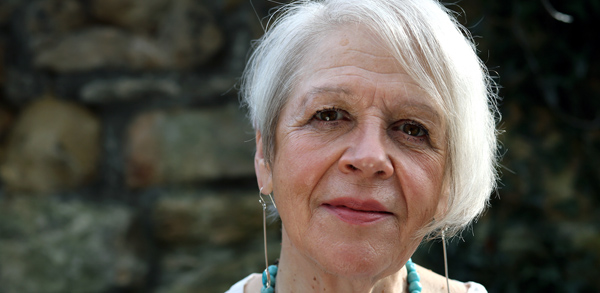This resource is great for:
Introducing the poetry of Liz Lochhead, discussing how she evokes place and writing your own poems inspired by place.
Summary:
Discussion points and a writing activity around Liz Lochhead’s poem Favourite Place.
Introduction:
At the Book Festival’s upcoming ReimagiNation: Cumbernauld festival, former Scots Makar Liz Lochhead, who was once a teacher in Cumbernauld, will be talking about how poetry informs our idea of where we’re from.
In advance of the event take a look at one of Lochhead’s poems, Favourite Place, which conjures up a sense of place.
We would be snaking up Loch Lomond, the
road narrow and winding after the turn at Tarbert
Favourite Place is available as a text or an audio file on the Scottish Poetry Library’s website:
http://www.scottishpoetrylibrary.org.uk/poetry/poems/favourite-place
http://www.scottishpoetrylibrary.org.uk/connect/audio/favourite-place-liz-lochhead
Activity – Poetry and Place
Part one – Discussing the poem
Talk about Favourite Place in general terms: Do you like it? How does it make you feel? What does it make you think about? Do you like the way it sounds? What effect does the poem have on you?
Check that everyone understands what the poem is about. How do you think Liz Lochhead feels about the places she mentions in the poem? What leads you to believe this?
Discuss the style of the poem and the fact that it’s written in free verse (without rhyme or regular rhythm). In the second to last stanza, the tense changes from past to future. Pick out examples of this. It’s not the present simple which is used, but words which evoke a potential future. What effect do you think this has?
Talk about the final stanza. Do you think it changes the effect of the poem overall?
Part two – Writing about your own place
Think about a holiday or journey you’ve been on which was particularly enjoyable or meaningful to you. Write a list of the places you visited on that trip and try to conjure up a brief memory associated with each place or the journey to get to them. Roughly list these descriptions together then try to shape them into a poem in free verse.
Part three – Nonsense rhymes
Read A Glasgow nonsense rhyme for Molly, another of Lochhead’s poems which strongly evokes place. The poem is available here:
http://www.scottishpoetrylibrary.org.uk/poetry/poems/glasgow-nonsense-rhyme-molly
Try your hand at writing your own rhyme for young children, bringing in some of the slang and references from where you grew up. Make sure you use repetition, onomatopoeia and rhyme.
Further information:
For more information and to book tickets for Liz Lochhead’s event at ReimagiNation: Cumbernauld on Sunday 21 May, visit the Book Festival Booked! blog:
https://booked.edbookfest.co.uk/event/liz-lochhead-poetry-and-place/
If you haven’t already explored Scottish Poetry Library’s website, do take a look. There’s lots of texts, audio recordings and podcasts as well as events, information and opportunities for teachers, families and budding poets:
http://www.scottishpoetrylibrary.org.uk/
